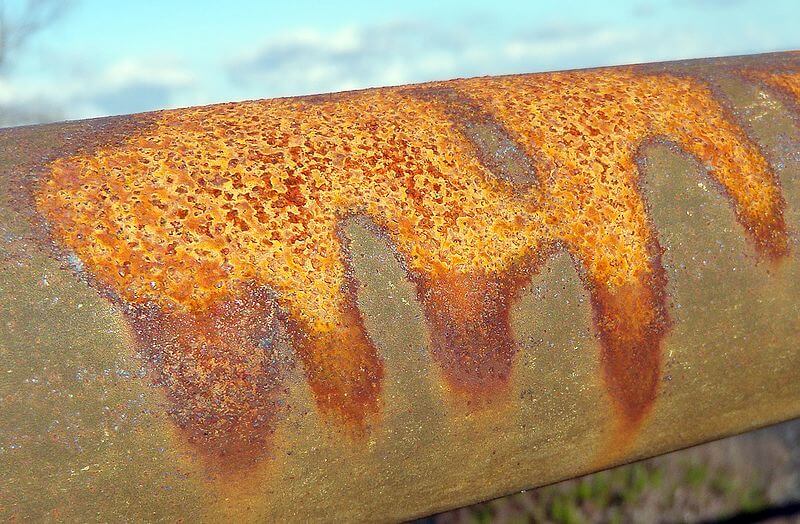To stop flash rust, clean the surface thoroughly and apply a rust inhibitor. Flash rust occurs when newly exposed metal reacts with water or humidity in the air, causing rust to form quickly.
Flash rust is a frustrating occurrence to anyone who works with metal. It is a type of rust that appears quickly on a freshly cleaned metal surface. Flash rusting can happen after cleaning or blasting a surface, and is caused by high humidity, moisture, or poor ventilation.
This type of rust can occur in as little as a few hours after cleaning, drastically affecting the appearance and protection of the metal. In this article, we will explore the causes of flash rust, how to prevent it, and the steps to take to stop flash rust from forming on your metal surfaces.

Credit: www.corrosionpedia.com
Understanding Flash Rusting
Flash rusting can be a pesky problem that occurs when you least expect it. But what exactly is flash rusting? It’s a reddish-brown rust that forms on metal surfaces in a very short period of time. This usually happens when the surface has been cleaned or exposed to water.
Flash rusting is caused by the reaction of metal with oxygen in the presence of water. Corrosion inhibitors can help prevent flash rusting. To prevent this from happening, be sure to keep the surface clean and dry, and apply a rust inhibitor if needed.
You can also use a primer to help prevent rust formation. By taking these steps, you can help keep your metal surfaces free of flash rust.
Prevention Techniques
Preventing flash rust is essential, and the key is good surface preparation. Ensure the surface is free from oil, grease, and other contaminants before applying rust inhibitors and protective coatings. Using sealants and moisture barriers can also prevent flash rusting.
Applying these techniques correctly can help safeguard surfaces from rust for many years to come. Remember that prevention is always better than cure when it comes to rust. Taking these measures can save a great deal of money and time on costly repairs.
Keep in mind that regular maintenance will help extend the life of your coatings and provide long-lasting protection against rust.
Flash rust treatment
Maintenance Strategies
Flash rust is a common issue in metal structures exposed to moisture and oxygen, but it can be prevented by employing effective maintenance strategies. Inspection and monitoring are crucial steps to monitor the condition of the metal surface and detect any signs of rusting.
Regular cleaning and maintenance can prevent the buildup of dirt particles and moisture, which can accelerate the rusting process. It’s also important to ensure that the surface is dry before painting or coating to prevent trapping moisture under the surface.
By implementing these strategies, you can stop flash rust and protect your metal structures from damaging corrosion.
Case Studies
Flash rust is a common problem that occurs after wet or humid conditions. Successful examples of flash rust prevention include proper surface preparation and using high-quality coatings. Blasting and applying a corrosion inhibitor can also be effective. A failed attempt includes lack of surface preparation, incorrect coating choice, and insufficient compliance with proscribed coating’s procedures.
It’s important to learn from failed attempts and identify the root cause of the flash rust problem. Preventive measures should be implemented. For instance, better surface preparation, which can involve manually removing any rust and then washing the surface with an appropriate cleaner.
It’s also necessary to store and handle corrosion inhibitors appropriately. This way, we can prevent the recurrence of flash rust and improve our operation quality and outcomes.
Frequently Asked Questions For How To Stop Flash Rust
How Does Flash Rust Occur?
Flash rust is caused by high humidity, moisture, and oxygen. Protective coatings can break down, allowing rust to form on metal surfaces.
What Are The Consequences Of Flash Rust?
Flash rust can cause discoloration, roughness, and loss of adhesion, which can affect the protective qualities of coatings.
How Can Flash Rust Be Prevented?
Flash rust can be prevented by maintaining a dry surface, avoiding high humidity, and applying a rust inhibitor or protective coating.
Conclusion
As we wrap up this guide on how to stop flash rust, it’s clear that this is a problem that can’t be ignored. Thankfully, there are several options available to prevent and curb the effects of flash rust, from using protective coatings to ensuring proper air circulation.
By taking a proactive approach to rust prevention, you can save yourself time and money in the long run. Remember to always clean and dry your metal surfaces thoroughly before applying any coatings, and to stay vigilant for any signs of rust or corrosion.
With these tips, you can keep your metal surfaces looking and functioning their best for years to come. Thanks for reading and happy rust prevention!
